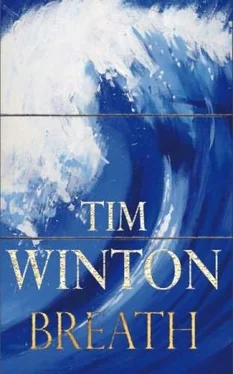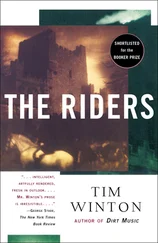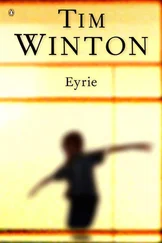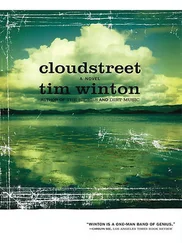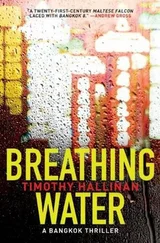Having yourself blasted from a blowhole is more silly than perilous and ours was a pretty naff effort. Thankfully, there weren't openings out there large enough for Loonie to climb right into; he had to settle for sitting across a foot-wide aperture to see what happened. All along that basalt shelf above the sea the blowholes sucked and gurgled around us, and each time a wave slammed in at the base of the cliffs there was an ominous lull before every crack and hole began to moan. When a good set hit the underbelly of the cliff the sudden blasts of spume could set you back in your tracks. The vapour had a nightmare stink. I kept well clear, fearful of the backdraught. I couldn't bear to think of being sucked down a black throat into the pounding guts of the caves below. I figured I'd rather be eaten alive by Barney.
In the end, Loonies misadventure was more undignified than death-defying. He saddled up with a sick grin and instead of being hoisted skyward, he was spat across the rocks horizontally. He came directly at me, legs pedalling, shirt blown fat as a lifejacket, and with all that snowy hair in his eyes he couldn't see where he was headed. I dropped. He caught his foot in the leg of my shorts and slammed down on the rock with twice the force he'd begun with. When he got up his arm was all wrong. It was a hard trek back to the Point.
We were lucky Eva was home. She saved me from having to wheel Loonie all the way back to town on my bike. He fainted twice in the cab of the VW and Eva tried not to appear as though she was enjoying his spells.
Barely three weeks later it was this fracture that prevented him from surfing Old Smoky. It changed things between us in ways we could neither foresee nor understand.
During the summer just gone, while we'd chafed at the chance to prove ourselves, the ocean went flat. We dived with Sando more than we got to surf with him. On breathless-hot days he took us out around the Point to remote groper holes along the cliffs. These trips were designed to test our lung capacity more than anything but we loved to hunt for food. We swam into deep granite crevices to pull abalone with Sando at our side, deeper with every dive, and often as not we outlasted him. I couldn't tell if Sando was simply letting us best him for reasons of his own, but Loonie and I had trained ourselves to really soak the goodness from a lungful of air. When it came to freediving we knew what we were doing, and going for abalone was infinitely more fun than lying on the black bottom of the river with your arms wrapped around a slimy tree root. The sea was brimming with stuff to help you forget the pain in your chest. It was worth the spotted vision and the roar in your skull to be able to chase a big blue groper into its lair. Some days we'd hike back across the ridge with a fifty-pound fish and a bag of abalone and spend the afternoon filleting and shucking in the shade of Sando's killing tree. While we worked we pestered him into telling us about Old Smoky. At first he was evasive about the bombora, but we kept at him until he gave up tidbits of information in his cagey, elliptical way; it was maddening, but it charmed us.
Right from the get-go Loonie was desperate to surf Old Smoky. He believed he was ready. I wasn't so sure I was up to it. The reef was a mile out to sea on a lonely, wild bit of coast, and from what I'd seen the wave itself was huge. Whenever there was a swell big enough to make it break properly you couldn't launch a boat within twenty miles, so the only approach was to bash out across the bush track from the Point to the cliffs, and crab your way down the rock-face until you got within jumping range. We were supposed to launch ourselves off the storm-swept cliff. And then you began the mile-long paddle out to sea. I dreaded it, was tantalized by the prospect, and the worse Sando made it sound, the harder it was to resist the thought.
When he knew we were hooked Sando stopped being coy. He brought out marine charts of the area to show how the seabed rose from the continental shelf, how drastic the bathymetry was at Old Smoky where water simply reared up on the shoal and turned itself inside out. He drew diagrams of the set-up for us, the landmarks to navigate by to find the impact zone and the safety of the deep channel beside it. It's a pretty simple affair, really, he told us. Once you choose the right wave you're halfway home, but if you judge wrong, if you take off from too far across the reef, then you're in more trouble than the early settlers.
Then he took us out there. It was a baking February day. The ocean was a mirror. From just beneath Sando s place we boated down the estuary, hauled the dinghy up over the bar and launched out into the placid bay where we skated around the Point and headed west to the cliff-coast beyond. The sea-torn footings of the bluffs were tranquil, the blowholes dormant.
When we got out to Old Smoky conditions were so calm there wasn't much to see from the boat. Sando confirmed the landmarks for us — the way the trees inland matched up with a streak of lime down the cliff inshore. The reef itself was only a dim shadow below.
Deep, I murmured.
Won't seem so deep from the top of a twenty-footer, said Sando. Let's see how deep. May as well do our homework.
We dropped the anchor in the purple water of the channel and ten fathoms of rope snaked out before it found bottom. We had only masks and no fins. We watched Sando plunge in and swim over to the reef. Loonie and I hit the water a moment later.
Rising sharply from the seabed the shoal at Old Smoky was like a sunken building, windows open, teeming with blue morwongs, harlequins and boarfish. In the water column above, schools of buffalo bream churned restless circles. Because Sando was watching and because we could, we speared past him for the bottom, to make solid the idea of the place and the stories we fed on. We kicked down barefoot and shaped ourselves to glide, purging as we went. In the mouths of caves were lobsters the size of cattle dogs. At thirty feet I took a handhold in the rock and rolled over to see Sando as a black star up there at the surface. Loonie slid down beside me and hooked on.
We hung there for the longest time, the two of us, locked in the old rivalry, smiling madly, around our snorkels while the sea clicked and rattled around us. Fish arrived, curious at first and then anxious when we showed no sign of moving on. In time they fled into the blips and specks at the edges of my vision.
The first big cold fronts arrived while the water was still warm. For the best part of a fortnight we pored over forecast maps, watching a chain of sub-Antarctic storms, hoping one might wander north towards us, or that two might converge and peel away in our direction to bring the sort of weather required to make Old Smoky break. Sando told us that the best of the groundswell would arrive before the storm-fronts themselves, that waves were little more than lines of energy from events beyond the horizon. I tried to imagine them, these radiating shocks, as they rolled toward us like harbingers of a trouble we couldn't yet see. Along with Loonie I was excited and jittery, though there was still something unreal about the rigmarole of preparation when the storms themselves seemed so abstract.
In these weeks before Easter Sando was solemn and pensive. We'd pedal out to his place only to sit on the steps for an hour while he went through his yoga routine and Eva glowered at us from the open doorway. We did our best not to pester him. We knew that he drove out along the ridges with his binoculars every day, that he was watching and waiting while we were in school, and we saw that he had huge, pointed big-wave boards laid out in. readiness beneath the house. There was nothing left to do but wait.
My parents wouldn't have had any idea about what I was preparing for. I can only assume that they accepted my story about Sando, who was, I said, just a bloke who gave Loonie and me a lift now and then, someone for whom we did odd jobs. Whether or not they believed this story, they never challenged me over it. They were not suspicious like Loonies old man. He had Sando and Eva pegged as layabouts and drug-addled hippies and he'd already forbidden his son from going out to their place, but Loonie — who was always good at covering his tracks and an excellent liar besides — had never been the sort of boy who felt compelled to do as he was told. He regularly slept at our place on weekends. For all his sly grins I knew he liked the homely manner in which my parents did things. He even liked the mortifying way my mother would come into my room some nights to try to tuck us into our beds. It was, I suppose, a taste of the domestic life he'd missed out on, though at times he seemed to be play-acting. Being with us a few days a week meant he could escape his father's brutal moods, but it was also a means of avoiding surveillance, for Sando had long been in the habit of picking us both up from my house.
Читать дальше
